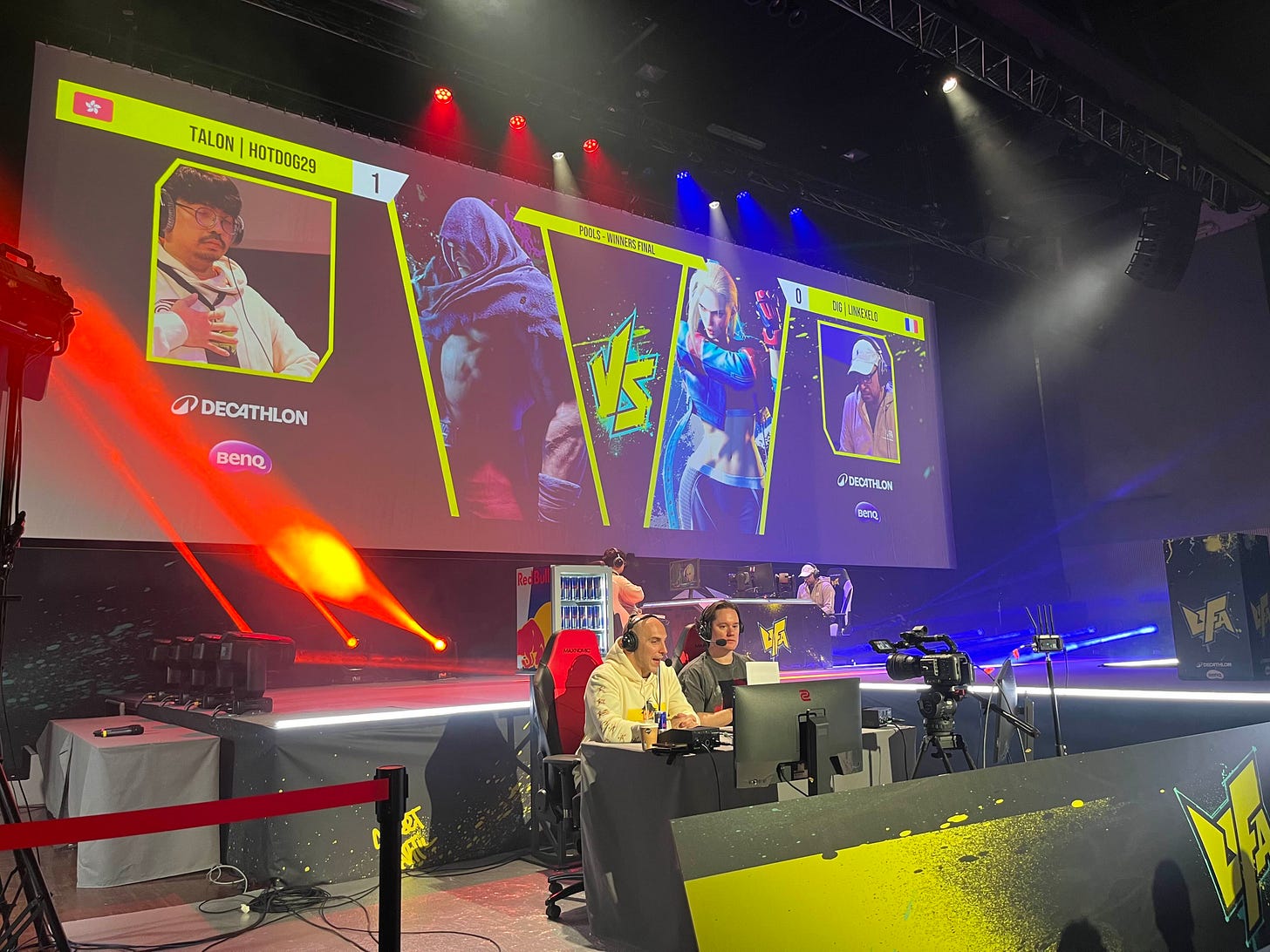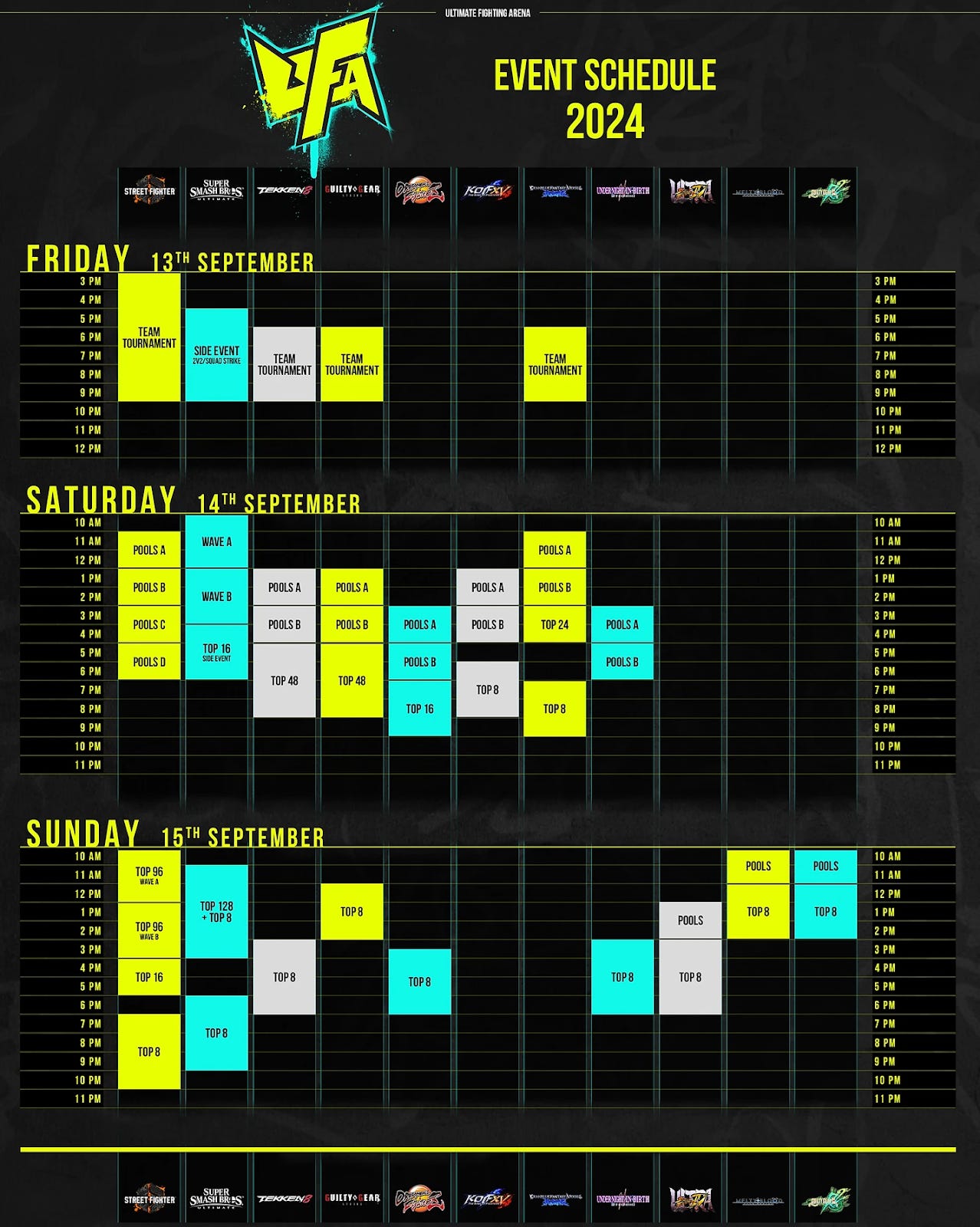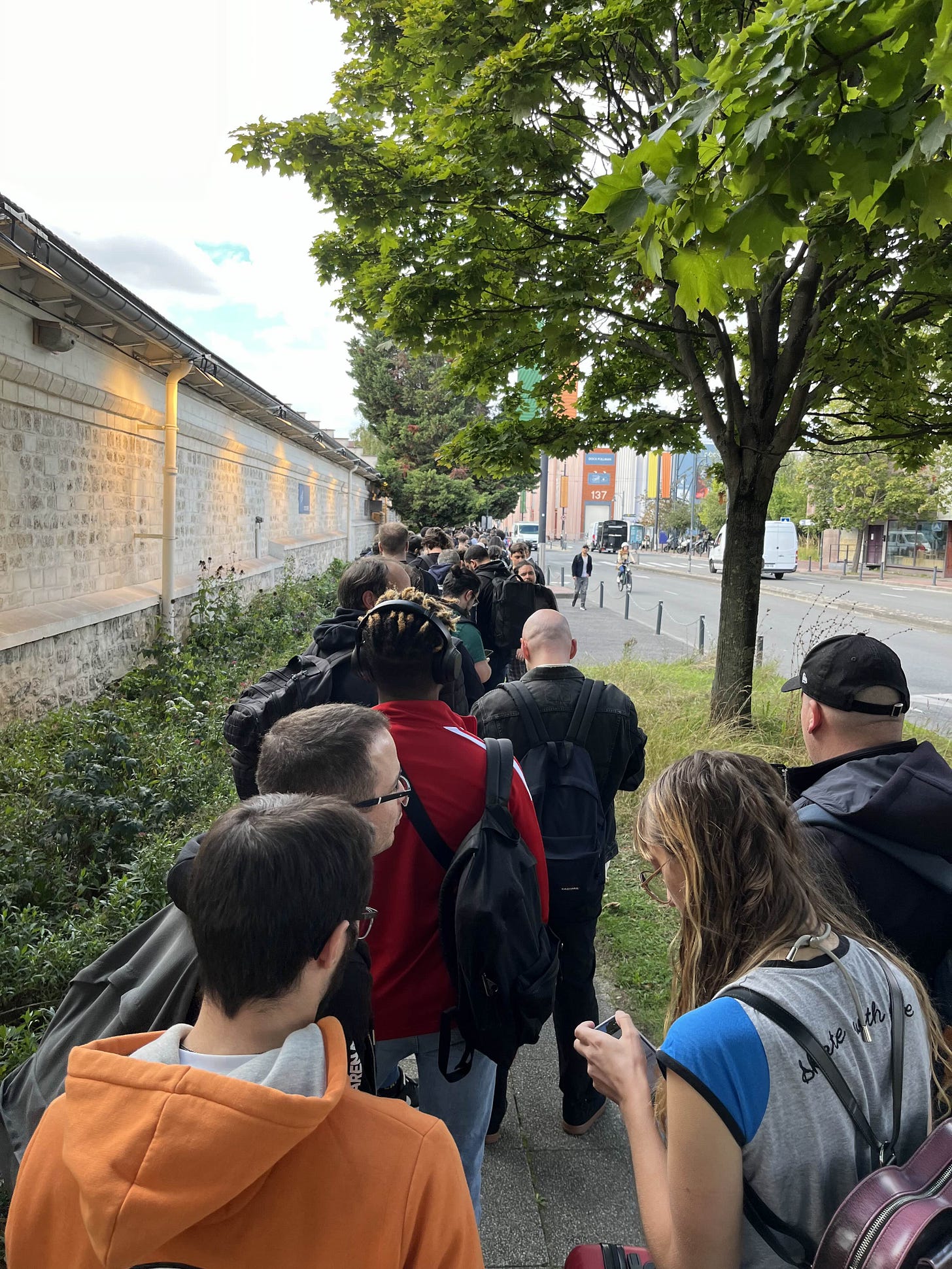
On September 13-15, the Docks de Paris events venue north of Paris was host to Ultimate Fighting Arena 2024. Prior to this event I had never attended a single fighting game community event in person. I only heard about UFA from watching the previous big FGC event that took place in Las Vegas in July - Evo.
I was unaware just how big UFA was, operating under the assumption that Evo was the “big” event of the year and everything else was regional and therefore tiny. That my three-day spectator pass only cost me 30 euro (approx 33.50 USD) didn’t dispel that notion until I actually entered the venue and saw who was taking part.
UFA, despite being a relatively young event, is not only the biggest FGC event in this part of the hemisphere but also winning it is a big deal. The majority of games taking part consider UFA part of their official circuits, meaning players that take part have a chance to qualify for other game-specific events like the Capcom Cup for SF6 or the Tekken World Tour. As a result, the tournament was swamped with recognizable names and faces I had previously only seen on Twitch live streams. I restricted myself to the SF6 portion, since it’s the game I’m most familiar with and the one with the biggest schedule, but several other games held various events over the course of the three days.

Day 1: Registration & Team Tournament
I turned up at around 14:00, hoping to be in plenty of time for the start of the team tournament. Since I was entirely new to all this, I made the rookie mistake of assuming the first queue I saw was the one to stand in. Pretty much everyone you see above was waiting in the line to pick up their player badges for pools on the second day. Spectators still had to check in to get their wrist bands, but that line was much smaller.
I also made the mistake of assuming that I wouldn’t have any opportunity to play other people in the venue aside from the arcade freeplay area, and so didn’t bring my controller. There were dozens of PC setups available for every game, and I could have easily sat down and played with numerous amateurs and pros on the first day until it was time to go home.
Instead, I sat down to watch the team tournament on the main stage and got an unexpected surprise. One of my favorite commentators from the FGC, Michael “IFC Yipes” Mendoza, also sat down a row behind me with another well known face, Luis "Rynge" Avila. Yipes is most well known for his Marvel vs Capcom 2 spiel from almost two decades ago:
In the years since he’s become a mainstay in the commentary booth of several games, often commentating the top 8s at various Evos, CEOs, Combo Breakers and other major events. In France, he was also on commentary duty but in the seats he was still doing it. On my end I was a mix of dumbfounded, is-this-real and also dying laughing at the things I was hearing coming out of Yipes. The quality of play was great to watch too. If I had brought my controller on this day, I wouldn’t be able to also watch the tournament. All six hours of it are up on YouTube if you want to see what the level of production was like.
By the time day 1 wrapped up, I had already talked to multiple people from across Europe, and had a good idea of what I wanted to do for day 2.
Day 2: Pools
Talking to a security card on the first day, pools on Saturday was looking to be the busiest of them all with at least 2000 people expected. I turned up just after 11:00, controller in my bag this time and made the second rookie mistake - always ask the TO first. Plenty of freeplay stations were available but the exact ones were known only only to the tournament organizers, who were mostly volunteers that were running the pools. They were the officials that entered the results into what is basically a big spreadsheet and their word is law.
Rules were strict: failing to show up at your pool would lead to a DQ, and with so many people competing in different blocs, there needed to be dedicated machines for those matches. So long as you checked with a TO what machines can be freeplayed on, you were good to match with whoever else had a controller. After being mildly chastised for not checking, I went on to spend a large chunk of the second day going up against whoever wanted to play me.
After a year of playing SF6 online and several other games in the comfort of my own home, IRL matches are an entirely different bag. For one, you’re right next to the other person. This felt very strange, especially after the past few years, though not at all hostile (ironic given the context). Around you is noise and lights from various stages up and down the hall as well as other competitors huddling around nearby machines watching the pros battle it out. The delay that you expect from online matches isn’t felt. Everything is a lot more instant and can be more easily reacted to, so the sort of things that work online just don’t fly in this setting. Needless to say, I got my ass handed to me repeatedly. At the same time it’s a hell of a lot more exciting and more often than not you end up talking to the other person about the stuff you’re respectively pulling off and sharing strats.
Between sitting down to play some games, chatting to folks from various FGCs and peering over the shoulders of the pros I recognized, day two wrapped up around 18:00 with the final 96 players decided for Sunday.
Day 3: Top 96, Top 16 & Top 8
The best word to sum up the final day of UFA 2024 was exhausting. The day started at 10:00 but I only turned up at around 15:00, catching the end of the Top 96 segment and the beginning of Top 16, but by the start of Top 8 four hours later I was tired, and I was just a spectator.
The main realization I had about this and other FGC events is this stuff is gruelling at a professional level. Players spend down periods waiting for their next round to start, only to go into a first to two match that could be over and done in literally two minutes. Since the tournament is double elimination, if they were in the winners bracket, then the loser of that match gets knocked down to the losers bracket, where the stress is cranked up even higher. Meanwhile the winner is probably feeling the negative effects of their body dumping the adrenaline out of their system, only to have to go and repeat the process a few minutes later. It certainly explained the prevalence of energy drinks at these events, but I couldn’t help but be concerned for the condition of some players, especially when it got to Top 8.
Watching back the live stream at a later time to hear the English commentary, I noticed that the feed didn’t do justice to how tired some of the players looked. Adel “BigBird” Anouche looked pale and sweaty and so it wasn’t a surprise sitting in the crowd when he crashed out in Round 1 of losers. At this point in the day around 19:00 at night, most of the players looked done, bar two: Zeng “Xiao Hai” Zhuojun from China, and Paris local Maivine "Kusanagi" Touitou.
Xiao Hai had been knocked into the losers bracket by British Aki player Rob "Broski" Livingston earlier, but was stoic throughout as he advanced towards Grand Finals. Kusanagi meanwhile looked like he was fully at home, strutting on stage and cruising through the tournament, only looking disturbed when he lost four rounds in a row to Xiao Hai despite the repeated pleas of the local crowd.
What the livestream feed also didn’t do justice was the sheer noise of the people around me. Xiao Hai triggering a bracket reset by winning the first set 3-2 only made the crowd louder for the Grand Final reset, which finally closed out 3-1 to Kusanagi in dramatic fashion.
A few things need to be added to give context to this segment that, on face value, looks incredibly basic. The first loud scream at 23:24 at Kusanagi’s dragon punch (where Yipes shouts “shoryuken”) was the first sign things were swinging the other direction. The reason is Kusanagi had repeatedly failed to punish jump-ins from Xiao Hai up until this point and if you go back earlier in the video, you’ll hear disappointment from the crowd and the commentators on this point. At 23:39 in, a throw loop begins. Throw loops were happening throughout top 8, but they were being done by Xiao Hai. Kusanagi fully turned the tables and threw Xiao Hai six times in a row as if to punish him. The local crowd around me didn’t just begin roaring with each successive throw, they were on their feet by the third. Xiao Hai eventually makes the right choice at 23:50 to escape the loop, only to be punished with another dragon punch - the move that Kusanagi had been neglecting to use in the first few matches. The end result was a finale that was almost ludicrous in how well it was paced and how much hype it drew from the crowd.
Overall, UFA’s production was great. It might not have been the most informative thing to cover from an indie game development perspective, but over the course of three days it demonstrated, over and over, why people gather together to play games. It helps to be reminded of that.
Lastly, I recommend checking out the fantastic pictures snapped by Vexanie on their site, since they have a knack of capturing the character of every event they cover.




